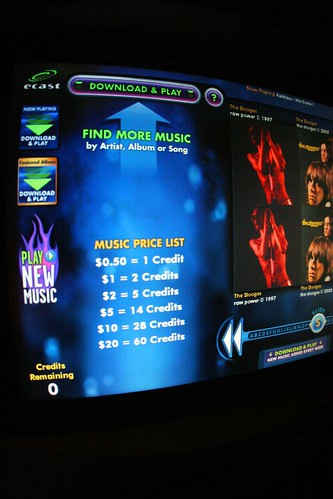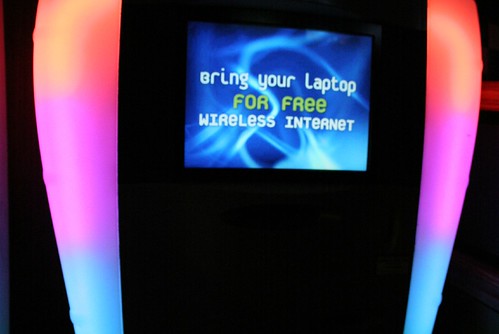Back in the day, jukeboxes were the talk of the town. Patrons lined up to play their favorite songs in packed bars and restaurants while record labels capitalized on the promotional possibilities. Eighty years and a few format shifts later, technology is rapidly changing the way people listen to music. Enter Ecast, a San Francisco-based company of die-hard music fans that has returned the jukebox to its glory days and beyond.
— “Jukeboxes: Overview” ( www.ecacstinc.com)
Kudos to the people at Ecast for their success, but the MP3 jukebox is the worst thing to happen to bars since the invention of the Jaeger bomb. Am I a luddite? Hardly. I am obsessed with digital music technology and use it regularly. I am, however, a sucker for nostalgia, a self-proclaimed bar aficionado, and I have occasionally been dubbed a music snob. Although the gigantic library offered by Ecast (3,000 songs on the jukebox hard drive and an ever-expanding catalog of music numbering around 150,000 songs) seems like the whiskey-soaked music snob’s dream, it is really our enemy.
At face value, the MP3 jukebox seems brilliant and, truthfully, from a digital music nerd standpoint, it is, and its invention makes sense. As media technology has evolved—vinyl to cassette to CD—so has the technology of the jukebox—vinyl to CD and now to digital. The problem is that I am unable to reconcile my thirst for technology with my love of the mechanical jukebox.
The first problem with the MP3 machines is that their contents are all the same. Trying to choose 7 songs from 89 albums hand-selected by a potentially disgruntled staff, many of which I may or may not hate, is part of the fun. MP3 jukeboxes make it too easy because they has everything and what they don't have can possibly be downloaded. A press release quotes Jamie Brown, owner of San Francisco’s 540 Club:
With more than 150,000 songs to choose from on our Ecast broadband-enabled jukeboxes, listeners can always find a song they want to hear. And when new albums are released people can check them out on the jukebox in a place that’s fun to hang out, instead of going to their local record store.If the bar were located in my hometown in rural Pennsylvania, where the only local record store you will find is the $2.00 cassette tape rack at a truck stop, this would be true. But what’s so bad about record stores when your local record store is Amoeba or Aquarius? In this case, the press release is regarding the San Francisco Weekly and the SF Bay Guardian crowning the 540 Club’s Ecast MP3 jukebox “Best of San Francisco.” For shame, San Francisco.

A music snob can rock one of these jukeboxes all night long (at 50 cents a song it's a good thing they take credit cards!). But on the other hand, so can any asshole with bad taste and a wallet full of cash or plastic. The point is that it takes the fun out of having bar owners and staff stock the jukebox for the bar. A jukebox is as important to a bar’s identity as the man slinging whiskey bottles, and a bar whose clientele listen mainly to Wire and X should have a jukebox that reflects this. We should not have to be in danger of hearing Britney Spears or something equally awful.
Chances are that if there is nothing on the jukebox for you, that bar is not the place for you. While I tend to have a relatively egalitarian view regarding access to booze, I believe that by offering all music to everyone in any bar makes it more difficult to identify the “kind” of bar it is— biker bar, punk bar, etc. It is about personal choice, and I often use the jukebox as a gauge for deciding what kind of bar I’m in and whether or not I like it. The taste of music found in the jukebox is indicative of a bar’s personality, just as knowing that someone likes to bungee jump leads you to believe they are a risk-taker.
Herein lies the genius of the MP3 jukebox: because the selection is so limitless, you just can’t hear it all in one set. These things are cash cows. People keep coming back to hear more and more because they know it’s available. In a February 2005 article in the San Francisco Business Journal, Christian Vara of Melo-Tone Vending (the company operates 33 Ecast jukeboxes in and around Boston) is quoted:
My Ecast-powered jukeboxes outperform my CD jukeboxes by as much as 4-to-1. That's because they have access to such a huge catalog of music, and because they never go down.But the imperfections of regular jukeboxes are part of what makes them wonderful. The user interface on an MP3 jukebox is a brightly colored touch screen. As I mentioned in a previous post, the interface is reminiscent of a Wells Fargo ATM. Additionally, all of the albums are organized alphabetically. In an Ecast jukebox the amusement of seeing Al Green on top of Motorhead next to the Yeah Yeah Yeahs is lost—and with it the challenge of trying to correctly match the letters and numbers listed on the album in the box with the letters and numbers on the keypad with one eye open. The full color touch screen interface is as unfeeling and impersonal as the ridiculous messages the jukeboxes display when in “screensaver” mode (see the picture below).

Imagine if Zeitgeist got one of these. Can you picture the legions of people working on laptops at the picnic tables on summer days? I can and I don't like it.
I partially intend this project to be about the bars as much as the jukeboxes. To me, the two are often inseparable. I go to certain bars because I love their jukeboxes, and I love the control over what CAN’T be played that is exercised by the bar’s staff (via exclusion). So the main problem for me, above all else, is the loss of something unique to a bar’s identity. Take, for instance, the difficulty I had writing the post for the Valley Tavern. There is no way I can chronicle 3,000 albums with just a pen, a notebook, and jkoshi’s camera to work with, but I also know that each Ecast jukebox I encounter will offer the same selection. There will be no highlights or low lights, because then I might as well copy and paste the same post for all of them. Instead, I have to concentrate on what people play on them, and how that fits into the personality of the bar: what was played that was great, what was played that should never be played again, what I happened to notice while flipping through the albums in line for the bathroom. Thus, I will show how, contrary to Ecast’s statement at the head of this post, the jukebox is not being returned to its glory days at all, but being stripped of its individuality.

5 comments:
Just you wait until every bar has an AirTunes setup. You're gonna listen to Aerosmith and you're gonna like it!
"Take me to your leader."
You are missing an important allowance that Ecast makes for individual taste. Each bar has a unique hard drive with on-premise storage of up to 300 albums. These albums are available for one credit per play (50 cents) and the selections are 100% customizable to the bar's individual taste. No two hard drives are the same. It is true you can download virtually any song for an additional credit charge ($1) through their broadband connection but two thirds of all selections are made from the local bar selection. I think this strikes a reasonable balance between the quest for original programming and the quest for a great selection of music for those willing to pay a little extra! I also understand (I'm in the amusement machine industry) that new street releases are updated to the library every week. Even for a music snob, you should reconsider if the positives outweigh the perceived negatives!
I was very pleased to find this site. I definitely enjoyed reading post regarding touch screen jukeboxes and I have it bookmarked to check out new stuff posted regularly.
It has been some time since I visited website with such high quality information. Thank you so much for providing such helpful information. This is really informative and I will for sure refer my friends the same. Thanks..
Post a Comment